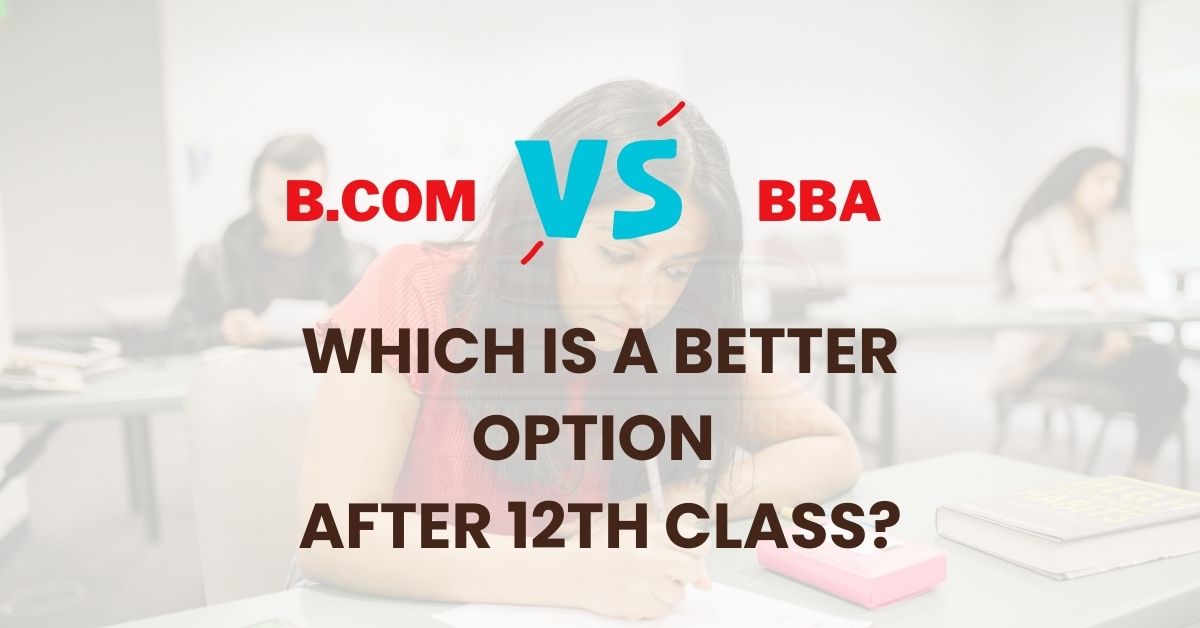
CA vs CMA: Which is the Right Career Path for You?
For those wanting to work in finance, it’s crucial to choose between CMA vs CA. Both routes are fruitful and provide a range of professional

Choosing the right career path after completing 12th grade in Commerce can have a huge impact on your future earnings and job satisfaction. With multiple options available, selecting a course that aligns with your interests and career goals is highly significant. Through this blog, we wish to guide you through some of the best courses to pursue after 12th Commerce, highlighting their potential for high-paying jobs.
Professional courses with high earning potential include Chartered Accountancy (CA), Cost and Management Accounting (CMA), and Company Secretary (CS). Let’s dive into the details.
Cost and Management Accounting focuses on the management of cost efficiency and financial planning. This course is ideal for those who are interested in strategic decision-making and financial management.
The CMA course is structured into three levels: Foundation, Intermediate, and Final. Each level involves a blend of theoretical knowledge and practical training designed to build a comprehensive understanding of cost and management accounting.
1. CMA Foundation Level: The CMA Foundation level is the entry point for the CMA course. It is developed to provide students with basic knowledge in cost accounting and related subjects.
2. CMA Intermediate Level: The CMA Intermediate level builds on the concepts learned in the Foundation course, presenting deeper insights into cost accounting and management practices.
3. CMA Final Level: The CMA Final level is completing the CMA course, focusing on advanced topics and specialised areas of cost and management accounting.
CMAs can work as cost accountants, financial analysts, and budget analysts. The starting salary for a CMA can range from INR 9-10 lakhs per annum, with higher earning potential as they acquire experience.
Gyan Sagar Classes offers specialised coaching for the CMA course, providing you with the knowledge and skills needed to excel in this excellent field.
A Company Secretary ensures that a company follows all legal and regulatory requirements. They play an important role in corporate governance and administration.
The CS course is split into three stages: Foundation, Executive, and Professional. It also comprises practical training and internships.
1. CS Foundation Level (CSEET): The CS Foundation level is the entry point for the CS course, providing primary knowledge in business laws and accounting.
2. CS Executive Level: The CS Executive level builds on the basics learned in the Foundation course, focusing on company laws, securities laws, and other essential areas.
3. CS Professional Level: The CS Professional level is the final stage, concentrating on advanced and specialised knowledge necessary for a Company Secretary.
Company Secretaries are in great demand in both public and private sectors. The starting salary for a CS can range from INR 5-7 lakhs per annum, with significant growth opportunities.
For those aiming to become a Company Secretary, Gyan Sagar Classes provides tailor-made coaching programs to help you navigate the course effectively and attain your career goals.
Chartered Accountancy is one of the most prestigious courses in the Commerce field. It is created to equip students with in-depth knowledge of accounting, auditing, taxation, and financial management.
The three stages of the CA course are called CA Foundation, CA Intermediate, and CA Final. It normally takes about 4-5 years to complete all three levels, including the mandatory articleship training.
1. CA Foundation: The CA Foundation is the entry-level course for becoming a Chartered Accountant, providing a fundamental understanding of accounting and related fields.
2. CA Intermediate: The CA Intermediate level builds on the basic learnings in the Foundation course, providing more in-depth knowledge of accounting and financial management.
3. CA Final: The CA Final is the last stage of the CA course, concentrating on advanced topics and specialised areas of accounting and finance.
Chartered Accountants are in high demand across numerous industries, including finance, consulting, and auditing firms. The starting salary for a CA can range from INR 6-8 lakhs per annum, with the potential to earn significantly more with experience and expertise.
For those looking to excel in Chartered Accountancy, Gyan Sagar Classes provides extensive training and support to ensure you succeed at every stage of your CA journey.
A Bachelor of Commerce (B.Com) degree provides an all-around understanding of commerce and business principles. It is a versatile degree that opens doors to numerous career paths.
Specialisations include Accounting, Finance, Marketing, and Human Resource Management. Each specialisation offers remarkable career opportunities.
B.Com graduates can easily work in the accounting, banking, finance, and corporate sectors. The starting salary can range from INR 2.5-4 lakhs per annum, with the potential for higher earnings with further qualifications and experience.
A B.Com degree functions as a foundation for higher studies such as CA, MBA, or M.Com, enhancing career prospects and earning potential.
Business management and administration are the main topics of study for professional undergraduate courses like the Bachelor of Business Administration (BBA).
The BBA curriculum consists of subjects like Marketing, Finance, Human Resource Management, and Operations Management. It also includes practical training and internships.
BBA graduates can seek careers in management, marketing, finance, and entrepreneurship. The starting salary for a BBA graduate can range from INR 3-5 lakhs per annum, with substantial growth potential.
A Bachelor of Economics (B.Econ) degree provides an in-depth understanding of economic theories, policies, and their application in the real world.
The course generally spans three years and includes subjects like Microeconomics, Macroeconomics, Econometrics, and Economic Policy.
Graduates can easily work as economists, financial analysts, policy analysts, and researchers. The salary for a novice in this career can range from INR 4-6 lakhs per annum, with higher earning potential in specialised roles.
A Certified Financial Planner (CFP) provides financial planning and investment advice to individuals and businesses.
To become a CFP, candidates must complete a certification program, pass the CFP exam, and acquire relevant work experience.
CFPs can easily work as financial advisors, wealth managers, and investment consultants. The starting salary for a CFP can range from INR 4-7 lakhs per annum, with the potential for substantial bonuses and commissions.
A Bachelor of Law (LLB) is a professional degree that trains students for a career in the legal field. It can be pursued after finishing 12th Commerce.
The LLB course generally takes three years to complete and includes subjects like Constitutional Law, Criminal Law, Corporate Law, and Civil Procedure.
Law graduates can operate as lawyers, legal advisors, corporate counsels, and judges after completing this course. The starting salary for an LLB graduate can range from INR 4-6 lakhs per annum, with the potential for higher earnings in private practice or corporate roles.
A Bachelor of Computer Applications (BCA) is an undergraduate course that provides knowledge in computer applications and IT.
The BCA course normally spans three years and covers subjects like Programming, Database Management, Networking, and Software Engineering.
BCA graduates can easily work as software developers, web designers, system analysts, and IT consultants. The starting salary can range from INR 3-5 lakhs per annum, with the potential for higher earnings in the IT industry.
Hotel Management is a professional course that prepares students for careers in the hospitality industry, including hotels, resorts, and event management.
Courses in Hotel Management can range from diploma to bachelor’s degree programs, generally lasting 3-4 years.
Graduates can work as hotel managers, chefs, event planners, and hospitality consultants after completing the course. The starting salary for a Hotel Management graduate can range from INR 3-5 lakhs per annum, with the potential for higher earnings in senior management roles.
Choosing the right course after 12th Commerce is important for securing a high-paying job and a fulfilling career. Whether you go for professional courses like CA, CMA, and CS, or degrees like B.Com, BBA, or BCA, each path offers unique opportunities and rewards. It’s important to select a course that aligns with your interests and strengths and to research and plan your career path early for better outcomes.
For those interested in professional courses such as CA, CMA, and CS, Gyan Sagar Classes offers complete training and support to help you achieve your career goals. Start your journey towards a successful and high-paying career today!
Get Admission Now

For those wanting to work in finance, it’s crucial to choose between CMA vs CA. Both routes are fruitful and provide a range of professional

Do you belong to the accounts field and want to make a difference in the industry? Well, you can pretty much make the difference by

If you are a student who has just completed the 12th standard with Commerce, then you are probably in the common dilemma that every student

Congratulation on completing your 12th standard. As you have started the next chapter of your life you all must be prepared for achieving good heights
Experienced Faculty
Personalized Support
Online/Offline Classes
Students Friendly Notes
For Offline Classes
For Online Classes
Gyan Sagar Classes is the leading institute in the field of CMA CA CS. GSC is best classes for CMA in Jaipur. Teachers of GSC are having more that 15 years of experience.